More and more SEOs and content marketers recognize the power of keyword clustering. If done right, this approach can bring you a lot of benefits like ranking your pages for groups of keywords instead of creating one page for every single long-tail keyword, more organic traffic, creating better content, improving your site, etc.
Would you like to find out how you can benefit from this great content marketing and SEO strategy? Keep reading.
In this guide, you’ll learn how to get the maximum ROI from keyword clustering using our keyword grouping tool. Here’s a sneak peek.
- How the Keyword Clustering helps to make Better your SEO and Content Marketing Performance
- How Does Keyword Clustering Work?
- How to Use SpySERP to Create Keyword Clusters?
- What is the better of Clustering Type – Soft or Moderate Clustering?
- What are the Cons of Manual Query Grouping?
- What are the Pros of Automatic Query Grouping?
- When is the Semantic Clustering Used?
- Final Words
Keyword Clustering: An Effective Content & SEO Strategy That Works in 2021
Google algorithms are evolving constantly and rapidly. Now it’s not enough to go for a single-keyword SEO creating a separate page for every keyword string. It may still work to some extent. However, all big players in the SEO game have already switched to a more effective tactic called “keyword clustering”. Now it’s your turn?
First things first. What is keyword clustering? It’s a more intelligent keyword research tactic when you find relevant keywords and cluster them into groups.
Why should you care about it? Keyword clustering helps you make your SEO efforts more effective as you can know exactly what keywords can be grouped together based on Google SERPs. This approach helps you create better content and rank it for more relevant search queries.
Still not convinced? Keep reading to find out more benefits that keyword clustering can bring to the table.
Keyword Clustering for Better SEO and Content Marketing Performance
There are many benefits that you can enjoy if you make keyword clustering a part of your SEO and content marketing strategy. Let us enumerate some of them:
- You’ll be able to rank your pages for more relevant keywords. It means more organic traffic to your site with less content.
- Google will perceive your pages as more relevant to search queries.
- It can have a good impact on your PPC campaigns. Keyword clustering can improve your Quality Score and CTR.
- It can help you to create a more efficient content plan for your blog.
- You’ll be able to create a better e-commerce site with suitable categories and web pages.
- It improves your overall site structure and UX making it more convenient for your visitors to navigate through your site.
- You’ll be able to maximize your content marketing and copywriting efforts by creating content to match topics relevant to your target audience.
- You’ll establish strong thought leadership in your niche.
- And of course, keyword clustering can help you create better and more effective landing pages. It can have a positive impact on generating traffic and leads
- It helps to avoid or eliminate keyword cannibalization, which can be a big traffic killer for your web pages.
Are you excited and want to know more about this approach? Keep reading.
How Does Keyword Clustering Work?
Clustering gives you a clear picture of how you should structure and group together relevant keywords for every page you want to create on your website based on TOP SERPs. This is a sure-fire and effortless way to discover how you can make your site better, more comprehensive, and keyword-rich in 4 steps.
- A bot creates and sends numerous automated queries to the selected search engines, collects data, and matches the analyzed web pages from SERPs to every keyword.
- If the selected search engine compares the same pages for various keywords with several matches, a bot will group such keywords together.
- You can customize a clustering degree (a minimum number of matches) to trigger keyword clustering.
- If there are no matches for the keywords in TOP of SERPs, they are grouped apart.
Keyword clustering is a challenging and time-consuming process. That’s why you may find it more convenient to use our keyword grouping tool to perform semantic clustering more accurately and quickly. Keep reading to find out how you can do it with SpySERP.
How to Create Keyword Clusters using SpySERP?
There are 2 ways how you can do your keyword clustering. You can do it manually as it is described in this awesome guide by Tom Casano from Moz.
Or you can save hours on the semantic clustering process using SpySERP that helps you be more efficient in performing all the time-consuming and tedious tasks for you in a matter of minutes. The great news is that you can start using it for free!
To start a 7 day free trial of SpySERP, you’ll need just an email or social networks. After registration, you’ll be granted a 7 day free trial of the 20K Pro plan without any limits.
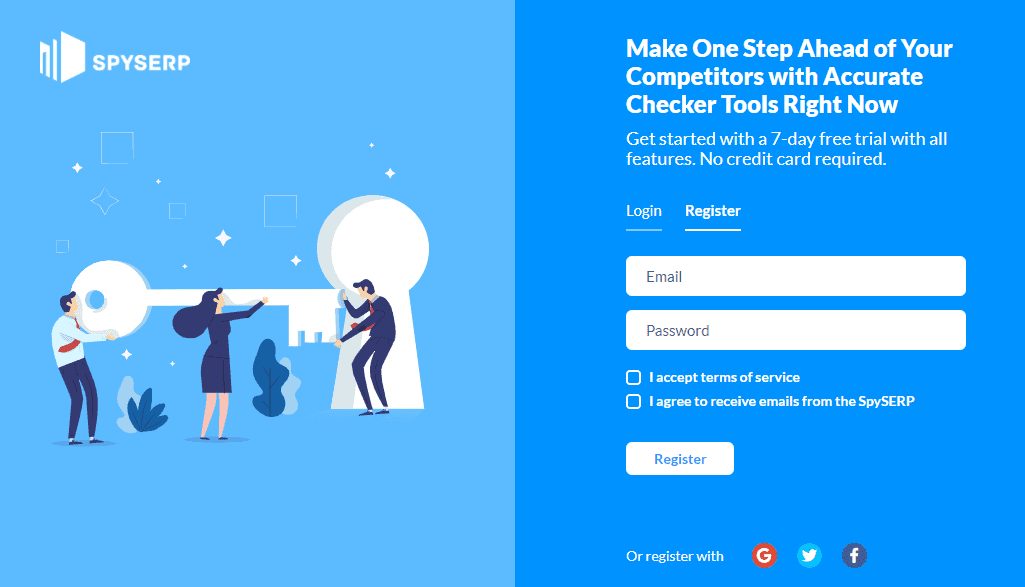
Enter your email, password, and hit the Register button. Then, confirm your account and create your first project in a few steps (this is clear for you, isn’t it)
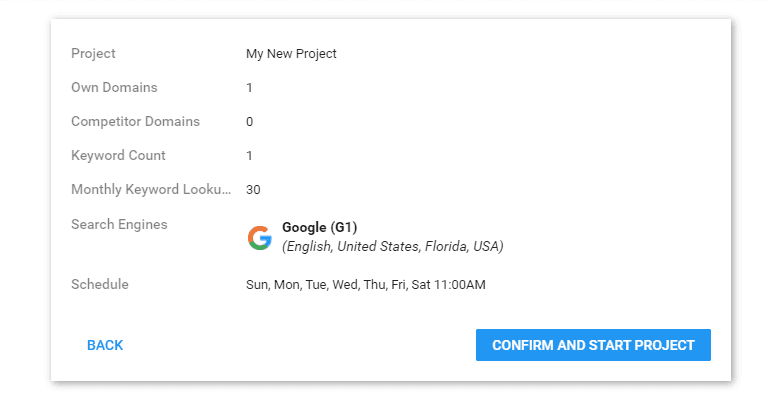
In your account area, right after the first crawl, you should just choose the Keywords Clustering section.
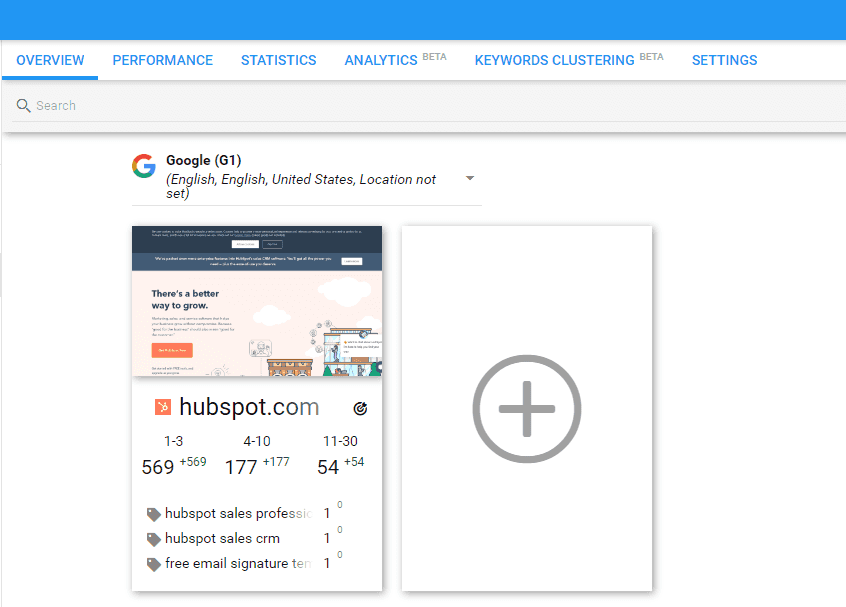
Here you’ll see 2 options.

Click the Add keywords clusters group. Then you need to configure the settings of your keyword clustering.
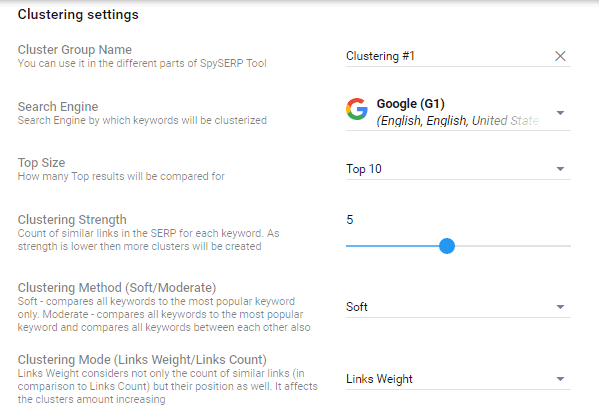
You can name your cluster group. Then you can select the search engine for clustering keywords, identify how many top results you want a keyword grouping tool to compare (from Top 3 to Top 100), choose the clustering method (soft clustering or moderate clustering), and choose the clustering mode (links weight or links count). Then click the create clusters button and wait for a few seconds.
Boom! Your keyword clustering is done. Easy peasy. Now you can see there are 104 clusters, 1000 keywords, 316 non clustered keywords.
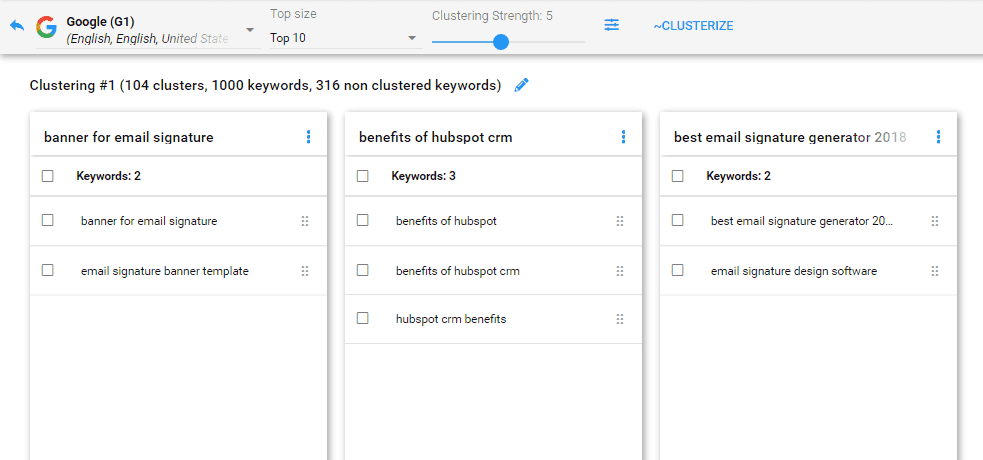
This is just an example of how our online clustering tool works. You can play around with the settings of the SpySERP keyword grouping tool to get more customized keyword clustering results tailored to the needs of your project.
You can save ready-made clusters and use them as categories in other sections of SpySERP, or export them for further work.
Clustering Type – Soft or Moderate Keyword Clustering
There are different types of keyword clustering out there.
- Soft keyword clustering. This is a method of grouping keywords around multiple clusters taking into account the popularity of keywords. The SERPs are compared with each other. If there are any similarities in a certain amount of SERPs for one keyword with SERPs for another keyword, they are grouped together in one cluster.
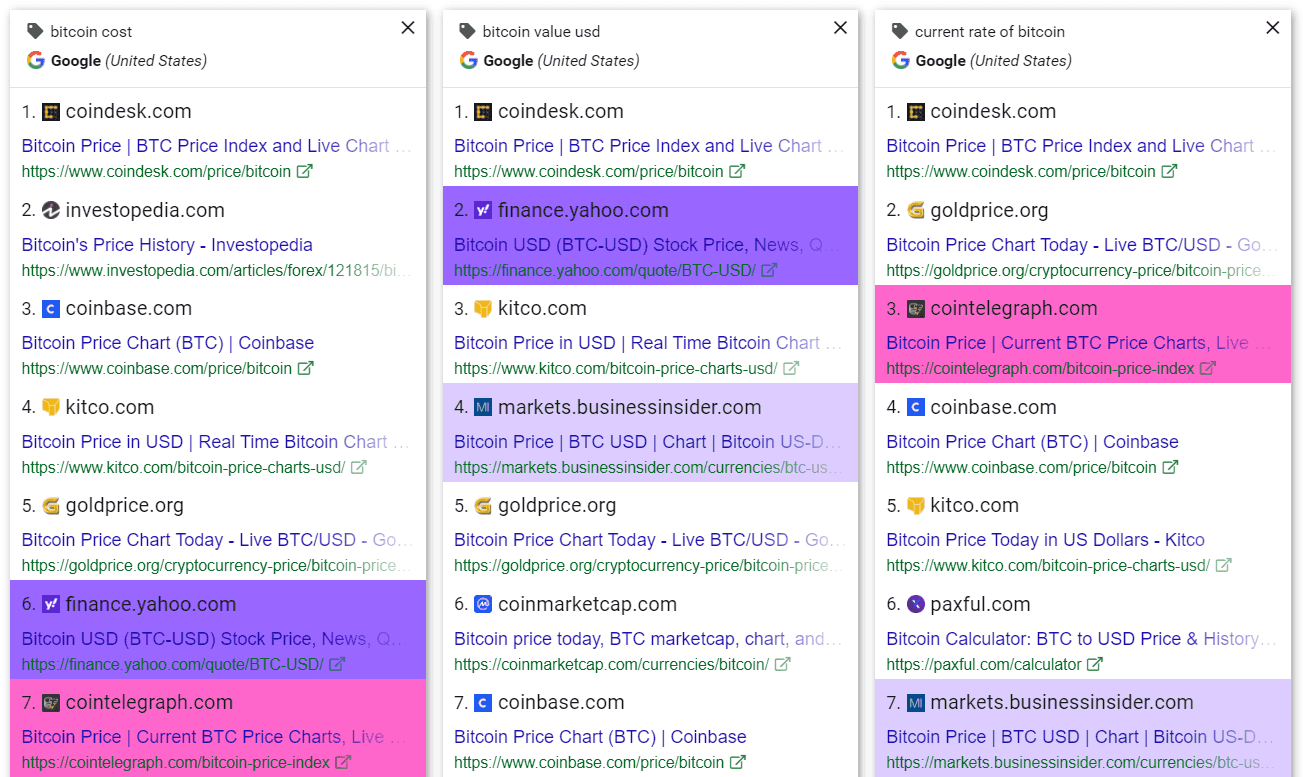
- Moderate keyword clustering. This is a method of grouping keywords around multiple clusters based on the relevance of keywords. This method implies that not only SERPs for all keywords are compared but also all the keywords are compared with each other.
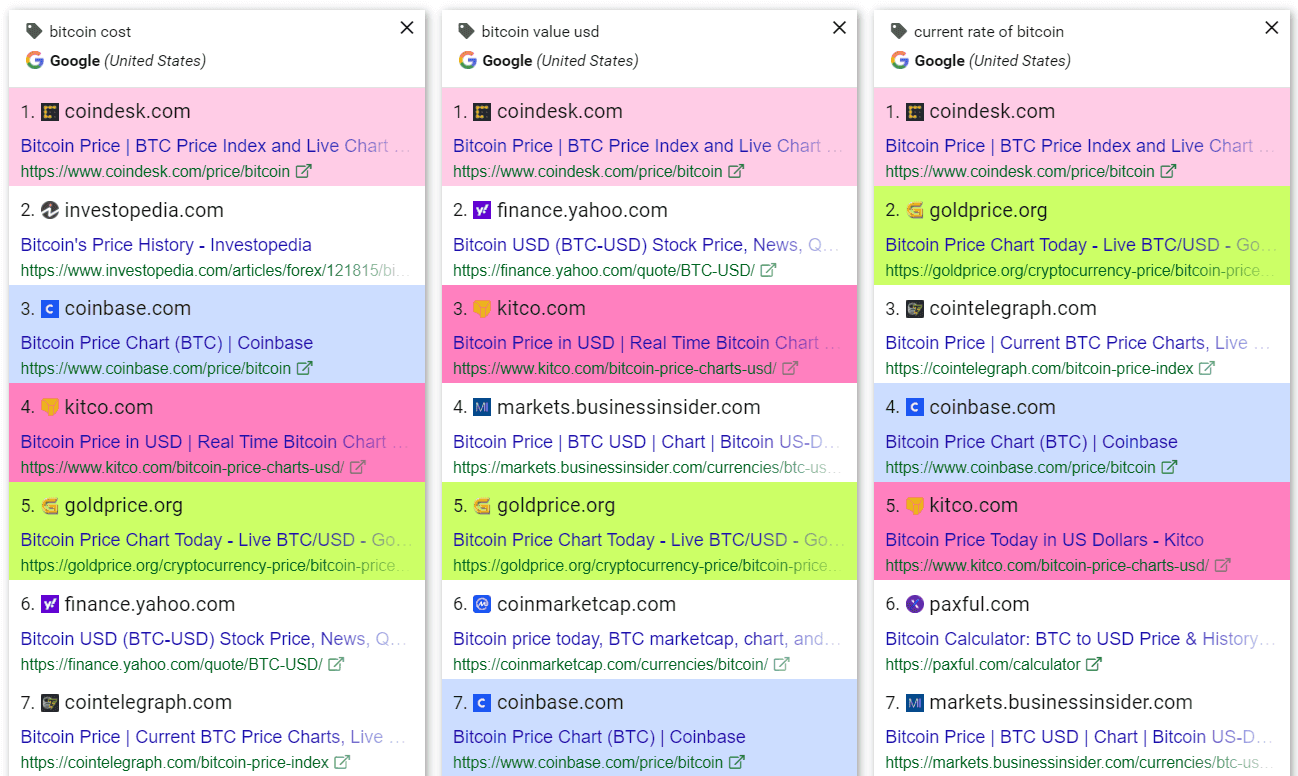
Moderate keyword clustering enjoys bigger popularity among digital marketers and SEOs.
There is a detailed video about Keyword Clustering by SpySERP
Cons of Manual Query Grouping
Some of the most common cons of manual keyword clustering are the following:
- In most cases, you need to use a combination of tools or plugins to get the needed data.
- The data may be not accurate and up to date.
- This process is going to take you a lot of time, hours, and maybe even days.
- It makes the whole process of query grouping more complicated and vague.
Pros of Automatic Query Grouping
Here are some of the most common benefits that you can enjoy if you choose automatic keyword clustering:
- More accurate data that can help you focus on better SEO and content marketing opportunities.
- The fast and streamlined process of keyword clustering takes minutes of your time.
- You can play around with the settings of the keyword grouping tool to get the best results.
- It’s super easy to start and use the tool.
- You can run multiple projects if you need them.
When is Semantic Clustering Used?
Semantic clustering is used widely by SEOs and digital marketers to maximize the ROI of the campaigns delivering the most complete answers through the content to fully match the queries that people are typing into search engines.
Final Words
Hopefully, this guide on keyword clustering will help you improve your own digital marketing and SEO campaigns. Have any thoughts to share with us? Feel free to post them below.





